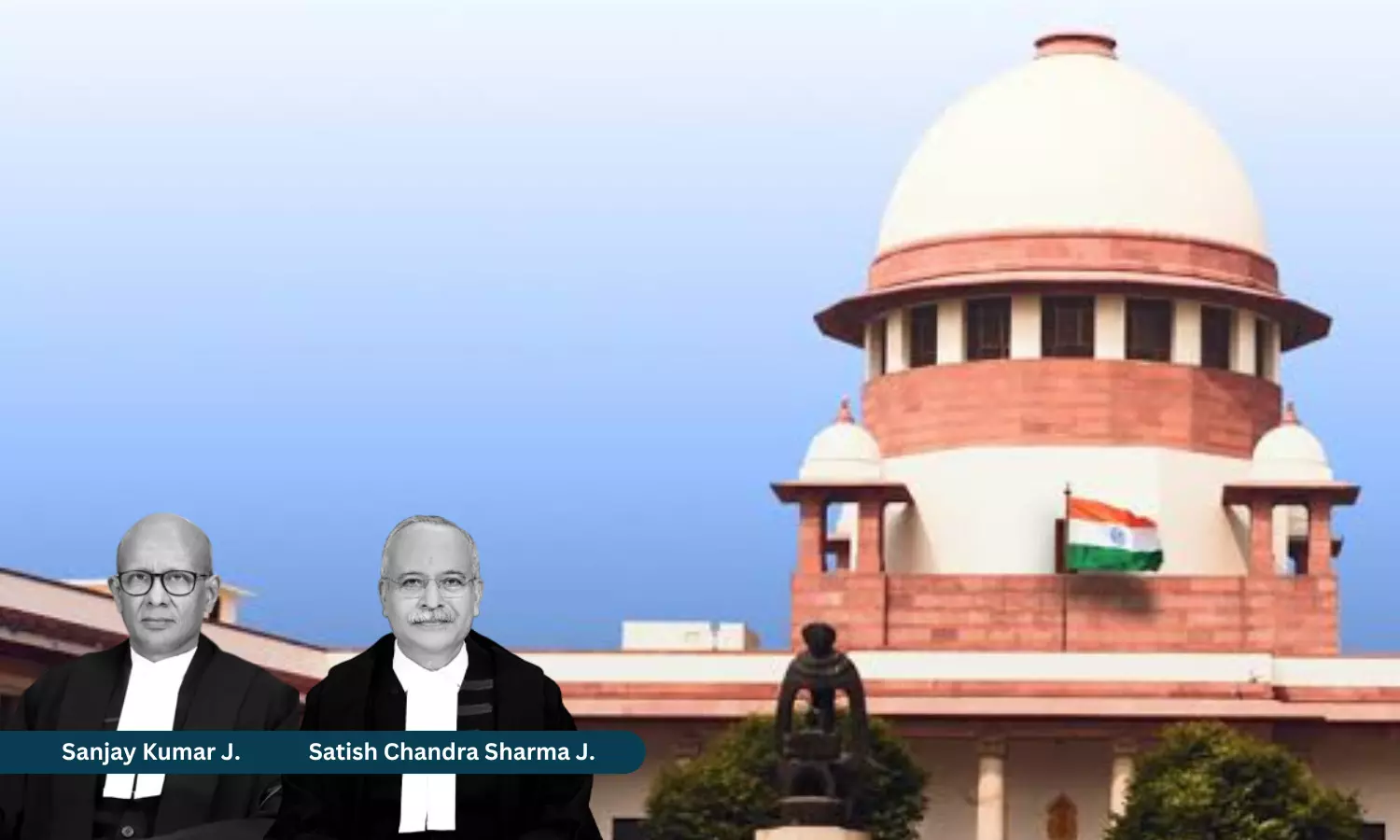
Justice Sanjay Kumar, Justice Satish Chandra Sharma, Supreme Court
Written Arbitration Agreement Covered Under Sections 44 & 45 A&C Act Needn't Be Signed: Supreme Court
 |
|The Supreme Court has held that an arbitration agreement need not be signed to be enforceable if the parties’ conduct and documented exchanges demonstrate consensus on the contract terms, including the arbitration clause.
The Supreme Court has clarified that under Section 44 of the Arbitration and Conciliation Act, 1996, which governs the enforcement of foreign awards, an arbitration agreement must exist in writing but does not require signatures if a valid written record is available and the conduct of the parties demonstrates mutual acceptance of its terms.
Setting aside the Delhi High Court’s orders, the Court held that the exchanges between Glencore International AG and M/s Shree Ganesh Metals, coupled with their subsequent actions, demonstrated a clear consensus on the terms, including the arbitration clause, making the agreement binding on both parties.
A bench comprising Justice Sanjay Kumar and Justice Satish Chandra Sharma observed that “Section 7(4) only added that an arbitration agreement could be found in the circumstances mentioned in the three sub-clauses that make up Section 7(4) but that did not mean that, in all cases, an arbitration agreement needs to be signed” and that "This legal principle would hold good equally for an arbitration agreement covered by Sections 44 and 45 of the Act of 1996."
Senior Advocate Gourab Banerji appeared for the petitioner. Senior Advocate Vinay Garg represented the respondents.
Background
The appellant, a global commodity trading company, and the respondent, a domestic zinc alloy manufacturer, had a long-standing commercial relationship and had earlier executed several contracts containing arbitration clauses governed by the Rules of the London Court of International Arbitration.
They later negotiated another agreement for the supply of zinc, where the respondent suggested a minor modification to the pricing terms, which the appellant accepted and incorporated into the draft agreement.
Although the respondent did not sign the document, their conduct demonstrated acceptance by partially performing the contract, furnishing standby letters of credit referencing it, and exchanging emails confirming obligations and assurances of completing the supplies.
Disputes arose when the respondent failed to meet payment obligations. The appellant invoked the letters of credit, while the respondent filed a suit in the High Court, challenging the invocation and seeking recovery.
The appellant sought reference to arbitration under Section 45 of the Arbitration and Conciliation Act, 1996, but both the Single Judge and the Division Bench of the Delhi High Court rejected the request, holding that the unsigned document did not create a binding arbitration agreement. The appellant then approached the Supreme Court.
Court’s Observation
The Supreme Court held that the requirement under Section 44 of the 1996 Act is that an arbitration agreement must be in writing, but it is not necessary for the parties to sign it if their conduct and documented communications establish consensus. Referring to the scope of Section 44, which defines a “foreign award” as one made pursuant to an agreement in writing, the Court explained that written communications exchanged via emails, letters, or other documentary records can satisfy this requirement.
In arriving at this conclusion, the Court relied on Govind Rubber Ltd. v. Louis Dreyfus Commodities Asia Pvt. Ltd., where it was held that an arbitration agreement, though in writing, does not require signatures if consensus can be inferred from the conduct of the parties and documented communications.
Similarly, citing Caravel Shipping Services Pvt. Ltd. v. Premier Sea Foods Exim Pvt. Ltd., the Court reiterated that a written arbitration clause can be valid and enforceable even without signatures, provided there is evidence showing acceptance.
The Bench also reaffirmed the principle laid down in Shin-Etsu Chemical Co. Ltd. v. Aksh Optifibre Ltd. that, at the referral stage, courts are only required to form a prima facie view of the validity of an arbitration agreement, leaving the final determination to the arbitral tribunal.
It noted that the respondent had acted upon the agreement by lifting part of the contracted quantity, furnishing multiple standby letters of credit referencing the arrangement, requesting amendments to those letters, and engaging in consistent correspondence affirming its obligations and assuring completion of supplies. Such conduct, the Court held, unequivocally established consensus on the terms, including the arbitration agreement.
The Court clarified that under Section 45 of the Arbitration and Conciliation Act, 1996, a judicial authority is required to refer the parties to arbitration unless it finds prima facie that the agreement is null, void, inoperative, or incapable of being performed. Since the materials on record clearly demonstrated that the parties had accepted and acted upon the agreement, the referral court had no basis to refuse reference to arbitration.
Based on these findings, the Supreme Court held that the High Court erred in concluding that no arbitration agreement existed. It ruled that the parties had accepted and acted upon the terms of the agreement, making the arbitration clause fully enforceable.
Conclusion
The Supreme Court allowed the appeal, setting aside the judgments of the Delhi High Court, and restored the appellant’s application seeking reference of the disputes to arbitration, noting that “the refusal by the referral court and the Division Bench to recognize the enforceability of the arbitration agreement was unsustainable on facts and in law.”
Consequently, the appellant’s application was allowed, and the disputes have been directed to be referred to arbitration.
Cause Title: Glencore International AG v. M/s Shree Ganesh Metals and Another (Neutral Citation: 2025 INSC 1036)
Appearances
Petitioners: Advocate Gourab Banerji
Respondents: Advocate Vinay Garg